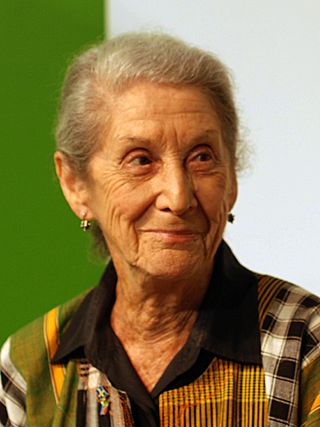
Nadine Gordimer was a South African writer and political activist. She received the Nobel Prize in Literature in 1991, recognized as a writer "who through her magnificent epic writing has ... been of very great benefit to humanity".
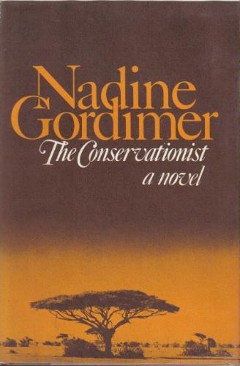
The Conservationist is a 1974 novel by the South African writer Nadine Gordimer. The book was a joint winner of the Booker-McConnell Prize for fiction. It is described as more complex in design and technique than Gordimer's earlier novels.
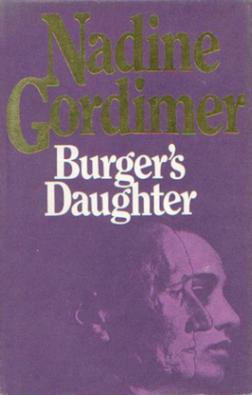
Burger's Daughter is a political and historical novel by the South African Nobel Prize in Literature-winner Nadine Gordimer, first published in the United Kingdom in June 1979 by Jonathan Cape. The book was expected to be banned in South Africa, and a month after publication in London the import and sale of the book in South Africa was prohibited by the Publications Control Board. Three months later, the Publications Appeal Board overturned the banning and the restrictions were lifted.

South African literature is the literature of South Africa, which has 11 national languages: Afrikaans, English, Zulu, Xhosa, Sotho, Pedi, Tswana, Venda, Swazi, Tsonga and Ndebele.
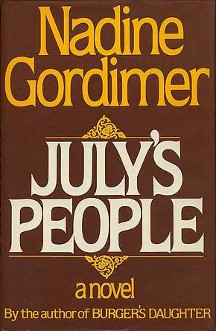
July's People is a 1981 novel by the South African writer Nadine Gordimer. It is set in a near-future version of South Africa where apartheid is ended through a civil war. Gordimer wrote the book before the end of apartheid as her prediction of how it would end. The book was banned in South Africa after its publication, and later under the post-apartheid government.
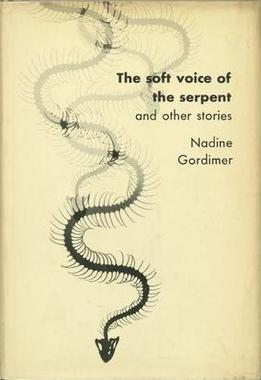
The Soft Voice of the Serpent and Other Stories is the second short story collection by the South African writer Nadine Gordimer, and her first to be published outside South Africa. It was published on May 23, 1952, by Simon & Schuster in the United States, and in the United Kingdom by Gollancz in 1953. It overlaps substantially with her first short story collection, Face to Face (1949), and the stories are set in South Africa.

A Sport of Nature is a 1987 novel by the South African writer Nadine Gordimer.

What Happened to Burger's Daughter or How South African Censorship Works is a 1980 collection of essays by South African novelist Nadine Gordimer and others. The book is about the South African government's banning and subsequent unbanning of Gordimer's 1979 novel Burger's Daughter.

No Time Like the Present is a 2012 novel by South African writer Nadine Gordimer. It was Gordimer's last published novel during her lifetime. The novel deals with a variety of issues in contemporary South Africa, including unemployment, HIV-AIDS, and corruption.

Occasion for Loving is a 1963 novel by Nobel prize-winning South African author Nadine Gordimer. It was her third published novel and sixth published book.

A World of Strangers is a 1958 novel by South African novelist and Nadine Gordimer. The novel included mixed reviews, drawing criticism for its pedantic explanation of Gordimer's worldview. The novel was banned in South Africa for 12 years.

A Guest of Honour is a 1970 fictional novel by South African writer Nadine Gordimer. Published four years after her novel The Late Bourgeois World, the novel is a political novel that explores the role of revolutionary ideas in new African states.
None to Accompany Me is a 1994 novel by South African Nobel Winner Nadine Gordimer. The novel follows the motifs and plot framework of a Bildungsroman, exploring the development of the main character, Vera Stark. The novel is set during the early 1990s in South Africa after the release of Nelson Mandela.
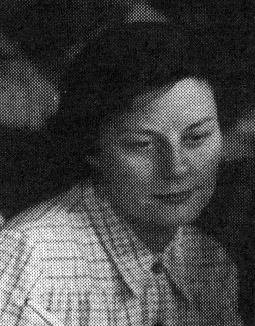
Bettie du Toit OLS was a trade unionist and anti-apartheid activist in South Africa.

The 1972 Nobel Prize in Literature was awarded to the German author Heinrich Böll (1917–1985) "for his writing which through its combination of a broad perspective on his time and a sensitive skill in characterization has contributed to a renewal of German literature." Böll is the fifth German author to be recipient of the prize.

The 2003 Nobel Prize in Literature was awarded to the South African novelist John Maxwell Coetzee, better known simply as J. M. Coetzee, "who in innumerable guises portrays the surprising involvement of the outsider." He is the fourth African writer to be so honoured and the second South African after Nadine Gordimer in 1991.

The 1991 Nobel Prize in Literature was awarded to the South African activist and writer Nadine Gordimer (1923–2014) "who through her magnificent epic writing has – in the words of Alfred Nobel – been of very great benefit to humanity." She is the 7th female and first South African recipient of the prize followed by J. M. Coetzee in 2003.

The 1990 Nobel Prize in Literature was awarded to the Mexican poet and diplomat Octavio Paz (1914–1998) "for impassioned writing with wide horizons, characterized by sensuous intelligence and humanistic integrity." He is the only recipient of the Nobel Prize in Literature from Mexico.
Fred Khumalo is a South African journalist and author. His books encompass various genres, including novels, non-fiction, memoir and short stories. Among awards he has received are the European Union Literary Award, the Alan Paton Award and the Nadine Gordimer Short Story Award. His writing has appeared in various publications, including the Sunday Times, Toronto Star, New African, The Sowetan and Isolezwe. In 2008, he hosted Encounters, a public-debate television programme, on SABC 2.

The 1983 Nobel Prize in Literature was awarded to the British author William Golding "for his novels which, with the perspicuity of realistic narrative art and the diversity and universality of myth, illuminate the human condition in the world of today".

















